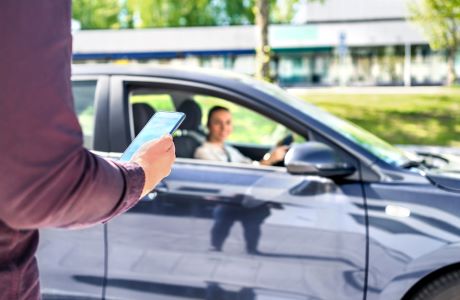
Uber and Lyft are the two most popular rideshare apps in Maryland, and while challengers like Hitch and Bolt are gaining traction, they seem unlikely to pose much of a challenge. If you were injured in a Baltimore rideshare accident, it almost certainly involved either Lyft or Uber. Comparisons between these two companies often focus on their financial performance, and Uber is the clear winner in that regard. But how do these two companies deal with rideshare injury claims in Baltimore? Is there any difference?
Uber vs. Lyft: Safety Requirements
Uber and Lyft have almost identical insurance policies, and they handle accidents in the same way. Aside from a few rules regarding the minimum age for drivers, Uber and Lyft also have many of the same safety features and policies. Both companies screen drivers before hiring them, requiring valid driver’s licenses and a certain amount of driving experience. Uber and Lyft drivers must also properly maintain their vehicles, and even slight cosmetic damage may make vehicles ineligible. Finally, both companies require newer vehicles, although the minimum model year varies slightly between Uber and Lyft.
Uber vs. Lyft: Insurance Coverage
When it comes to accidents, most injured plaintiffs will focus on insurance policy limits. Once again, Uber and Lyft are essentially identical in this regard. Although there are a few slight differences, their insurance policies should cover your full damages. It is possible to receive settlements worth millions from a Lyft or Uber accident – especially if you have suffered serious, permanent, and life-altering injuries.
Uber and Lyft Both Try to Avoid Paying You After an Accident
Uber and Lyft are both multi-billion-dollar tech companies that attempt to increase their profit margins as much as possible. As a result, they will almost inevitably attempt to avoid paying you a settlement after a car accident. Sometimes, Uber and Lyft rely on separate insurance companies for coverage. In other situations, they establish their own in-house “captive” insurance providers. Either way, both insurers and rideshare companies attempt to reduce the cost of accidents to the greatest extent possible.
A common strategy is to claim that the driver was not logged in at the time of the crash. If this is the case, the rideshare company can theoretically avoid liability. They might also claim that the driver was logged in but not “working” at the time of the collision. Although they would still be liable, the rideshare company could reduce payments in this situation. A qualified rideshare accident attorney in Baltimore can push back against these tactics – ensuring you receive a fair settlement.
Work With an Experienced Rideshare Lawyer in Baltimore
If you were injured in a rideshare accident, it shouldn’t matter which company caused your injuries. Whether you take action against Uber, Lyft, or some other rideshare company, you should receive all the compensation you need to cover your damages. Experienced car accident lawyers in Baltimore are familiar with the subtle differences between Uber and Lyft, allowing them to pursue compensation quickly and effectively. Reach out to Furman Honick Law today to get started with an action plan.
Sources:
uber.com/ca/en/drive/requirements/vehicle-requirements/?city=baltimore
help.lyft.com/hc/en-us/articles/115013082868-Maryland-Driver-Information